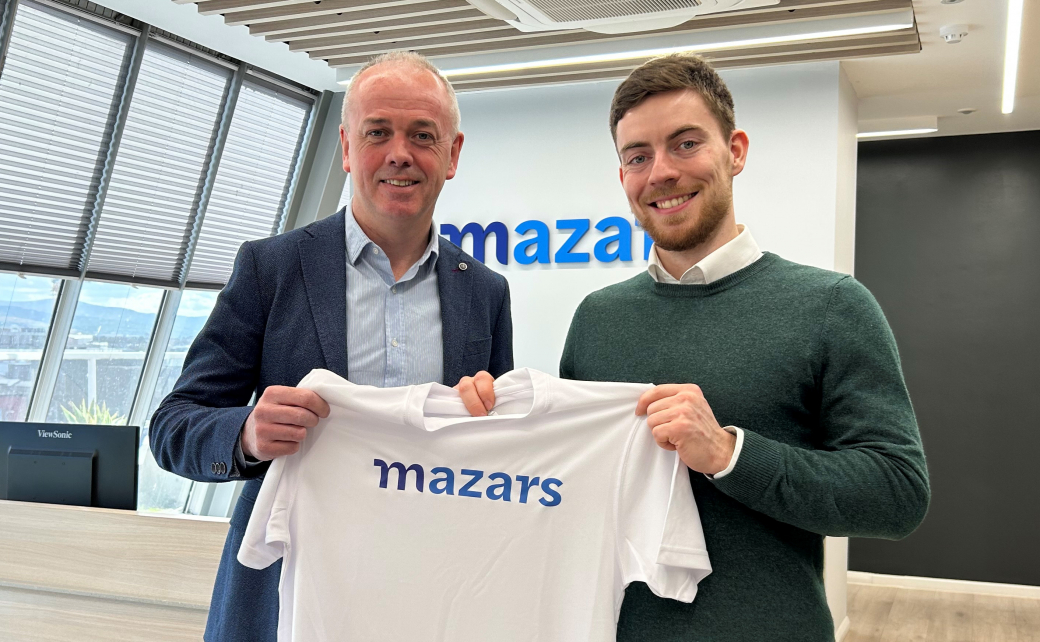Tell us about you and your role in Mazars
I am a member of the IT Audit team within the consulting department at Mazars. I work mainly on IT audit engagements to support financial statement audits, focusing on risk assessment and controls evaluation over computerised application systems.
How did you get into Boulder climbing?
Growing up, I was always the kid running around, climbing trees, climbing walls, and worrying the neighbours. My parents never realised that there was a sport there for me. Then, when I was 13, I went to a birthday party at the UCD climbing wall and was instantly hooked – within a week, I had joined the local kids climbing club, Winders.
What is the difference between bouldering and rock climbing?
Rock climbing grew out of the need for mountaineers to train during the off-season. Some came to discover that they preferred the short, difficulty-based nature of this training, and so the sport of rock climbing began. Over time the training for the sport, as well as avoiding the rain, led to indoor artificial climbing walls and competition climbing, of which there are two main disciplines. Bouldering, which is short four-metre high walls with soft landings underneath, and Sport climbing, which is much longer climbs (15-25 metres) with ropes. Both disciplines are performed in the same manner outside, although, with Bouldering, you carry large bulky crash mats around with you to lay on the ground.
Is the sport popular in Ireland, and how has it been developed in recent years?
When I first started out in the sport, the only climbing walls available were those in universities, which were very small, and not many people climbed so you knew everyone by name. Today there are four commercial gyms in Dublin alone, with two more currently under development. The sport has exploded in popularity since its induction into the Olympics in Tokyo along with the Oscar-winning documentary Free Solo, starring Alex Honnold.
You came runner-up in the Irish Bouldering Championships 2023. For the 2024 championships next Spring – are you ambitious to take back the crown?
You will not survive at the highest level in sport if you don't go into every competition aiming to win. That said, it's great to see the level of competition improve in Ireland over the past few years. With five national titles under my belt, I am always the favourite going into these competitions. I plan on adding number six from next year's championships!
You are part of the Senior Irish Climbing Team. What has been your transition to get onto the national squad?
I tried every sport when I was growing up, but it wasn't until I started climbing that I discovered the competitive side to me. From my first climbing competition, I knew that I wanted to be the best. I became more and more dedicated through my teenage years, taking a keen interest in sports science as I aimed to take my training to the next level. While it took seven years for me to make it onto the Irish Senior Climbing team, once there, I made an instant impact, proving that I was very much at home at that level. In my first year on the team, I was ranked second out of all Irish competitors at the World Championships.
You are part of the team representing Ireland at the upcoming International Federation of Sport Climbing (IFSC) World Cup 2023. What has been your preparation/training regime for the competition?
This late in the season, my training is mainly focused on getting a significant volume of actual climbing done and staying healthy and injury free.
Climbing is all about your fingers and your legs. Your fingers hold you on, and your legs generate the movement, so most of my time is spent training those two groups to be as strong as possible. During the winter training season, this means a lot of time in the gym lifting weights and jumping for the legs. My fingers then are trained mostly by attaching a load of weight to myself and hanging off a small, 20mm edge. The most I’ve done on this is adding an additional 84kg for 7 seconds.
Diet and sleep are also hugely important to my preparation. Ultimately you are having to carry your own weight up the wall, so having any excess can be a major hindrance. Staying focused on eating clean and, for me staying away from chocolate are priorities. Sleep wise, I need my 8.5 hours. Between training and work at the end of every day, I am beat, and it’s key that I can approach my next training session as recovered as possible to perform.
The World Cup takes place over three months between April & June in four countries and across three continents. How does the team manage the travel and logistics of competing?
The IFSC world cup series calendar gets released in November; this is when the team plans what competitions they can go to. Flights and accommodation are looked at, and plans are made. It is a hard fact of the sport here in Ireland that if you can’t afford it, you just can’t go. For most, this means that they can only attend one or two a year. This was the case for me until I started working full-time. This is also when we start to plan out training blocks/schedules. We organise individual training and team training sessions in different climbing centres around Ireland.
As the senior team has only three members attending competitions this year, organising everything was relatively straightforward. One of us would book everything for each competition, and then at the end of the season, we see what, if any is owed.
Mazars Managing Partner, Tom O’Brien, presenting IT Audit Trainee Ciarán Scanlon with some new kit before he leaves for Japan.
The Irish team has had to set up a fundraising drive through GoFundMe. Is there no national funding for your sport?
Since its inception, the Irish Senior team has been almost entirely self-funded. Our governing body, Mountaineering Ireland, provides our competition kits and registration for the IFSC competitions but flights, accommodation and expenses all come out of the athletes' back pocket.
This is the first year that the Irish Senior team will be competing in all six rounds of the IFSC World Cup series, presenting a significant financial burden for the athletes, which crowd funding helps alleviate. Mazars has been very supportive in helping fund my competition season, covering all costs associated with the Salt Lake City round. Without the support, I would be unable to attend each round, for which I am very thankful.
How do you balance a career / work life with competing in international competitions like this?
To be honest, it can quite a challenge. Getting up early every day to stretch, making sure I move enough at lunch, and getting in a training session every evening after work can be taxing at the best of times. There’s not much room for anything else. Even on weekends, I try to do longer training sessions as I don’t have to stress about getting home in time to get enough sleep for work.
All my annual leave goes towards travelling for the competitions, and I am very thankful that the head of consulting at Mazars, Dera McLoughlin, has arranged for additional leave to help cover this.
Climbing has often been represented sensationally by Hollywood in films like Mission Impossible, Cliffhanger and Vertical Limit. What is the reaction to those movies from the climbing community?
Amusement is the main reaction. You see so many outrageous movements performed in these films that would result in serious injury or death if attempted in real life. But it’s always fun to see what outlandish scenario Hollywood can come up with next!
Alex Honnold was featured on GQ Sports reacting to many of these films, and it's very amusing. You should check it out.
What skills has bouldering taught you that transfer to your professional life?
Problem-solving, perseverance, performing under pressure, goal setting, managing failure, and managing risk.
Finally, if you were to have a personal advertising slogan or tagline, what would it be?
Molann an obair an saor. “The work recommends the craftsman”. All the hard work I put in over the years really boils down to how I perform in five or six events a year. So it’s important to me that I show people and myself just what I can do when I go out there.
This also applies to how I approach my work in Mazars. When it comes to manager review or presenting results to clients, the work I perform is a reflection both on myself and the firm, and I strive to produce the highest quality I can.
Best of luck Ciarán!
The IFSC World Cup 2023 comprises four events:
Location | Date |
Hachioji (JPN) | 21-23 April |
Seoul (KOR) | 28-30 April |
Salt Lake City (USA) | 19-21 May |
Innsbruck (AUT) | 14-18 June |




